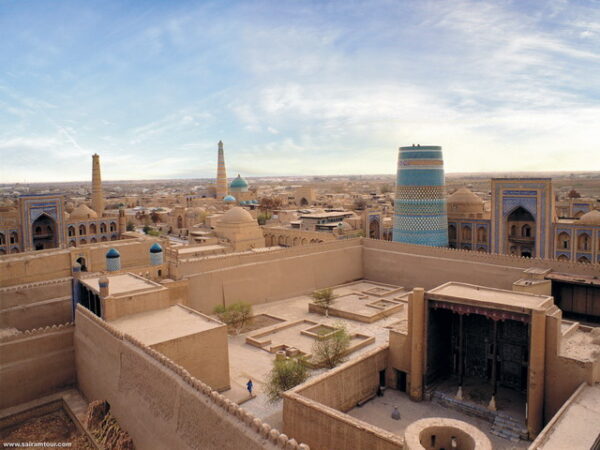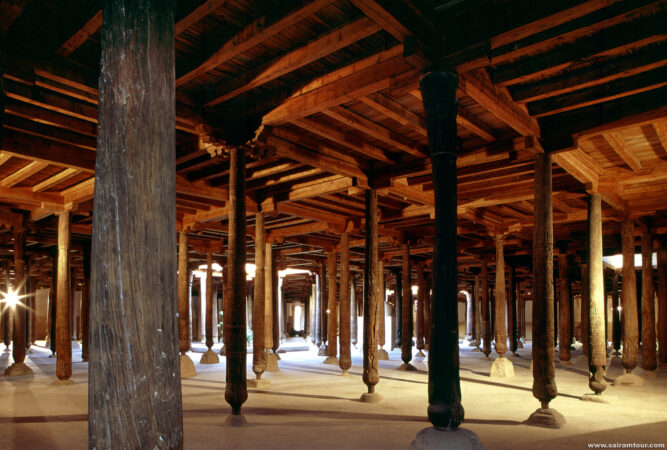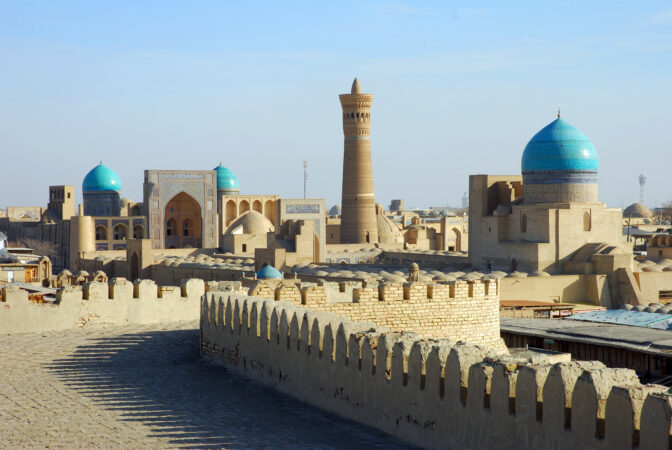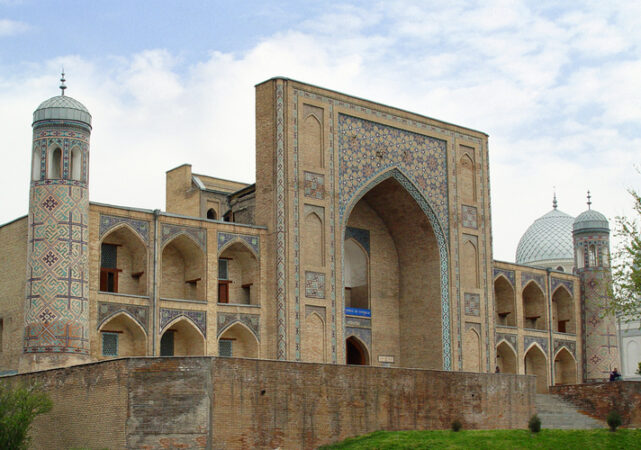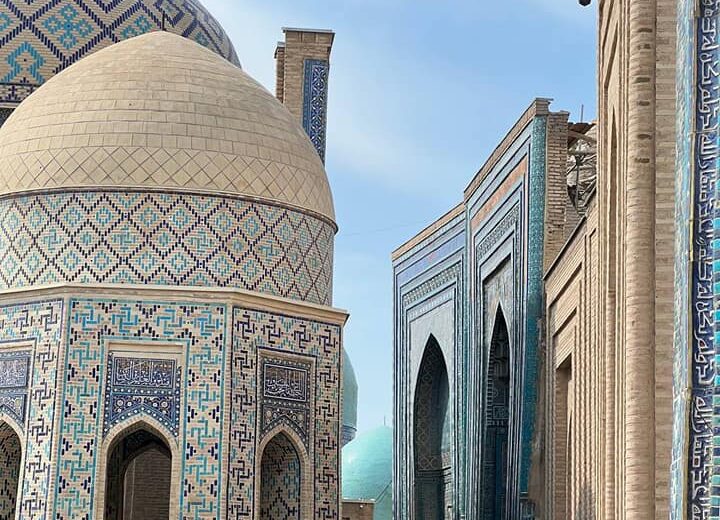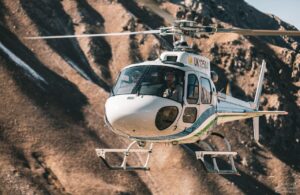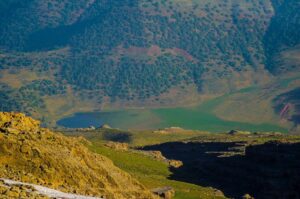Tour in Uzbekistan: A Journey Through the Ages
Описание
Immerse yourself in an exciting journey through Uzbekistan—a country with a rich history, unique architecture, and the unmistakable atmosphere of the East. This tour will introduce you to the ancient cities of the Great Silk Road, where you can explore unique Islamic monuments, experience traditional Uzbek cuisine, and feel the warmth of local hospitality.
You will visit Tashkent, where modernity blends harmoniously with traditions; Khiva, whose historical center, Ichan-Kala, is an open-air museum; Bukhara, a medieval center of science and religion, preserving its distinct Eastern ambiance; and Samarkand, a city that mesmerizes with its grand architecture and the magnificent Registan Square.
План тура
Day 1: Tashkent
Arrival: At Tashkent International Airport.
Transfer: To the hotel.
Accommodation: Check-in at the hotel, rest after the flight.
Overnight: In Tashkent.
Day 2: Tashkent
Breakfast: At the hotel.
Tour of the old city:
Hazrati Imam Complex - spiritual center of Tashkent, home to the ancient Quran of Caliph Uthman (7th century). Includes Barak-Khan Madrasah, Tillya Sheikh Mosque, and Kaffal Shashi Mausoleum.
Barak-Khan Madrasah - a 16th-century architectural monument built by the Shaybanid rulers, famous for its intricate brickwork and majolica tiles.
Tillya Sheikh Mosque - one of the main mosques of the city, built in the 19th century, known for its impressive library of religious manuscripts.
Kaffal Shashi Mausoleum - burial place of the renowned 11th-century theologian and poet, revered by Sufi followers.
Kukeldash Madrasah - one of the largest madrasahs in Central Asia, built in the 16th century, serving as a religious and educational center.
Tour of the modern city:
Independence Square - the main square of the capital, surrounded by government buildings, fountains, and the Monument of Motherland.
Memorial to WWII Victims - a complex dedicated to the memory of Uzbeks who perished during the war.
Courage Monument - honoring the victims of the devastating 1966 Tashkent earthquake.
Forum Palace - a grand venue hosting state events and international forums.
Amir Timur Museum and Square – dedicated to the great conqueror and founder of the Timurid Empire, showcasing rare artifacts and manuscripts.
Alisher Navoi Theater Square - cultural hub of the city, home to the State Academic Bolshoi Opera and Ballet Theater, built by Japanese POWs.
Shopping tour:
Alay Bazaar - one of the oldest markets in Tashkent, famous for its selection of dried fruits, nuts, and fresh produce.
Chorsu Bazaar - the largest traditional market in Tashkent, housed under a blue dome, offering spices, sweets, carpets, textiles, and souvenirs.
Transfer: To the hotel.
Overnight: In Tashkent
Day 3: Tashkent – Urgench – Khiva
Early transfer: To the airport for a domestic flight to Urgench.
Flight: HY 051, departure at 07:00, arrival at 08:20.
Transfer: Upon arrival in Urgench, drive to Khiva.
Tour of Ichan-Kala:
Ichan-Kala Historical Complex (12th–19th centuries) – a UNESCO-listed open-air museum showcasing Khiva’s architectural wonders.
Kunya-Ark (16th–17th centuries) - an ancient fortress and residence of Khiva’s rulers, including a mosque, mint, harem, and guard towers.
Kurinish Khana Mosque - the main ceremonial mosque for Khiva’s rulers, used for diplomatic receptions.
Abd al-Bobo Complex - religious site featuring the mausoleum of the revered saint Abd al-Bobo.
Kutlug Murad Inaq Madrasah - an 18th-century madrasah with unique brickwork and Islamic ornamentation.
Muhammad Rahim Khan II Madrasah - one of Khiva’s largest spiritual schools, renowned for Islamic law and sciences.
Islam Khodja Minaret and Madrasa - Khiva tallest minaret (56m), completed in 1910.
Transfer: To the hotel, check-in after 14:00.
Continuation of the tour:
Said Allauddin Mausoleum - one of Khiva’s oldest structures (14th century), burial site of a revered Sufi saint.
Muhammad Amin Khan Madrasah - the largest madrasah in Khiva, built in 1855, located next to Kalta Minor Minaret.
Kazi-Kalon Madrasah - one of the significant Islamic schools of Khiva.
Kalta Minor Minaret - an unfinished but majestic minaret, originally intended to be the tallest in Central Asia.
Juma Mosque (10th century) - famous for its 218 wooden carved columns, a unique Islamic architectural landmark.
Allakuli Khan Madrasah - part of Khiva’s architectural ensemble, built in the 19th century.
Tash Hauli Palace - a lavish royal residence with a harem, throne hall, and reception area.
Pahlavan Mahmud Mausoleum - the burial site of Khiva national hero and poet, featuring turquoise domes.
Overnight: In Khiva
Day 4: Khiva - Bukhara
Transfer: Journey to Bukhara (480 km) on a comfortable coach through the Kyzylkum Desert.
Stop en route:
Amu Darya River - one of the largest rivers in Central Asia, providing a great opportunity for memorable photographs.
Arrival in Bukhara:
Accommodation: Check-in at the hotel and rest after a long transfer.
Overnight: In Bukhara
Day 5: Bukhara
Breakfast at the hotel.
City tour of Bukhara:
Ark Fortress (4th century BCE) - the ancient citadel that served as the residence of Bukhara's rulers for centuries.
Bolo Hauz Mosque (18th century) - a historical mosque with wooden columns, representing traditional Bukhara architecture.
Ismail Samani Mausoleum (10th century) - one of the oldest surviving monuments in Central Asia, a masterpiece of early Islamic architecture.
Chashma-Ayub Mausoleum - linked to the legend of the Prophet Job and its sacred healing spring.
Chor-Minor Madrasah (18th century) - an unusual structure with four minarets, built by an Indian merchant.
Magoki-Attori Mosque (12th century) - one of the oldest Islamic structures in the region, built on the site of a former Zoroastrian temple.
Poi-Kalyan Complex (12th - 16th centuries):
Mir-i-Arab Madrasah - an active religious school.
Kalyan Minaret - an iconic symbol of Bukhara, standing at 46 meters, known as the "Tower of Death."
Kalyan Mosque - one of the largest in Central Asia.
Ulugh Beg Madrasah (15th century) - one of three madrasahs built by the Timurid ruler and astronomer Ulugh Beg.
Abdulaziz-Khan Madrasah (17th century) - decorated with intricate mosaics and inscriptions.
Nodir Divan-Begi Madrasah (18th century) - part of the Lyabi Hauz architectural ensemble, featuring unusual depictions of mythical creatures.
Lyabi Hauz Complex (14th–17th centuries) - the central part of the old city, centered around an artificial reservoir.
Covered Trading Domes (16th century) - famous historical bazaars where visitors can buy traditional souvenirs, textiles, spices, and jewelry.
Transfer to the hotel and overnight in Bukhara
Day 6: Bukhara - Samarkand
Breakfast at the hotel.
Excursion to the summer residence of the last Emir of Bukhara – Sitorai Mokhi-Khosa Palace.
A luxurious palace complex built in the early 20th century, combining elements of Eastern and European architecture.
Features exquisite halls decorated with mosaics, wood carvings, and stucco, along with collections of antique furniture and artwork.
Transfer to the train station.
Departure to Samarkand on the high-speed train Afrosiyob, Train No. 769 (14:34 – 16:17).
Arrival in Samarkand.
Transfer to the hotel, check-in.
First walk through Samarkand.Exploring the city's atmosphere, walking through central streets and squares.
Overnight stay in Samarkand
Day 7: Samarkand
Breakfast at the hotel.
Sightseeing tour of Samarkand:
Registan Square - one of the most famous architectural ensembles in Central Asia, consisting of three magnificent madrasahs:
Ulugh Beg Madrasah (15th century) - built by the great astronomer and ruler Ulugh Beg, it was a leading educational center of its time.
Sherdor Madrasah (17th century) - notable for its unique depictions of tigers and the sun on its facade, a rarity in Islamic architecture.
Tillya-Kari Madrasah (17th century) - richly decorated with golden frescoes, featuring one of Samarkand’s most beautiful mosques.
Gur-Emir Mausoleum (14th–15th centuries) - the tomb of the great conqueror Amir Timur, as well as his sons and grandsons, including the astronomer Ulugh Beg. The majestic turquoise dome has become a symbol of Samarkand.
Afrasiab Museum - dedicated to the ancient settlement of Samarkand, showcasing artifacts from archaeological excavations, including rare frescoes from the 7th–8th centuries.
Ulugh Beg Observatory - an outstanding scientific structure of the 15th century, where Ulugh Beg conducted astronomical research. The remains of a giant sextant used to calculate the positions of over a thousand stars are preserved here.
Transfer to the hotel.
Overnight stay in Samarkand
Day 8: Samarkand-Tashkent
Breakfast at the hotel.
Continuation of the sightseeing tour in Samarkand:
Siab National Bazaar - the largest market in Samarkand, where visitors can buy fresh fruits, nuts, oriental sweets, spices, and traditional Samarkand bread. This place captures the true essence of the East.
Bibi-Khanym Mosque - one of the largest religious structures in Central Asia, built in the 14th century by Amir Timur in honor of his beloved wife. The impressive ruins and restored sections of the mosque showcase its grandeur and intricate architecture.
Shah-i-Zinda Necropolis - a complex of mausoleums built between the 11th and 19th centuries. This sacred site houses the tombs of nobility and Timurid family members, including the presumed grave of Qusam ibn Abbas, a cousin of Prophet Muhammad. The complex is famous for its stunning blue mosaics and intricate decorative patterns.
Transfer to the train station.
Departure to Tashkent on the high-speed train Afrosiyob (18:00 – 20:20).
Arrival in Tashkent.
Transfer to the hotel. Check-in and rest.
Overnight stay in Tashkent
Day 9: Tashkent-Departure
Transfer to Tashkent International Airport.
Departure home

